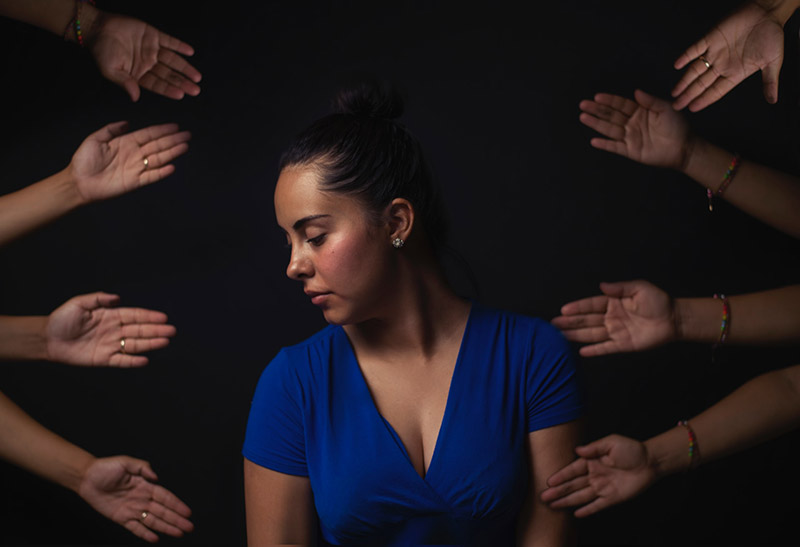This post may include affiliate links to products we think you'll find useful. We may earn a small commission if you buy through these links. Read our affiliate disclosure.
If you don’t like being touched by other people, it can make you feel very confused and ashamed. The constant pressure to be physically intimate puts a huge strain on your relationships, and you can tell that other people think you’re weird or cold.
If you suffer from touch aversion, the most important question you probably have is why? Why does being touched make you feel so uncomfortable, and why are you so different from everyone else? It feels impossible to have ‘normal’ relationships with romantic partners, family, and friends.
In this article, I’ll look at all the possible reasons you don’t like being touched and what you can do about it.
Is it normal not to like being touched?
The answer to this question depends on the cause and severity of your touch aversion. The human desire for physical contact exists on a spectrum, and some people simply don’t need or want as much touch as others. If your aversion to touch is mild and doesn’t cause problems in your life, then it’s perfectly normal and nothing to worry about.
However, if you have a strong aversion to touch that makes you feel anxious or afraid, then it could indicate a more serious underlying condition such as a mental health issue, phobia, or past trauma. Just let common sense be your guide – if you’re worried about your aversion to touch, it’s always best to speak to a professional for advice.
Why touching is important
Humans are social creatures and need physical touch to feel connected to others. The simple act of touching someone else can communicate a whole range of emotions, from love and comfort to anger and aggression. Touch also plays a vital role in developing bonds between people, particularly between parents and infants.
People who don’t receive affectionate touch can suffer from physical and mental health problems. For example, studies have shown that babies who are not held or cuddled enough can fail to thrive and may develop attachment disorders. Adults who don’t receive enough touch can also become isolated and depressed.
Touch aversion also has a damaging effect on your relationships. If you’re constantly pushing people away or avoiding physical contact, it can make others feel rejected, unimportant, and even unloved. This is particularly true in romantic relationships, where touch is an essential part of intimacy.
Reasons you don’t like being touched
There are many different reasons why you might not like being touched. It could be due to a medical condition, psychological issue, or simply a personal preference. Let’s take a look at some of the most common reasons people avoid being touched.
1. You value your personal space
You may simply be very selective about who you allow into your personal space and don’t like being touched by people you don’t know or trust. This is perfectly normal and nothing to worry about. Everyone has different comfort levels when it comes to physical contact with strangers, and there’s no right or wrong way to feel.
If you value your personal space, it can feel like a boundary violation when someone tries to touch you without consent. Just be mindful that they probably don’t mean to make you feel uncomfortable, so try to deal with the situation tactfully. Over time, I’m sure you’ve developed techniques to protect your personal space without coming across as rude or unfriendly.
2. You suffer from haphephobia
Haphephobia is a specific phobia of being touched. It can be a very debilitating condition that makes it difficult to carry out everyday activities such as shaking hands, hugging, or even being brushed against by a stranger.
Haphephobia is thought to be caused by a combination of genetic and environmental factors. For example, if you have a family history of anxiety disorders, you’re more likely to develop a phobia yourself. A traumatic event such as sexual assault or domestic violence can also trigger Haphephobia.
If you think you might be suffering from haphephobia, it’s important to seek professional help. A therapist can help you to understand your fear and provide treatment to help you manage your symptoms.
3. You’re suffering from a mental health issue
Touch aversion can be a symptom of various mental health disorders such as anxiety, depression, or PTSD.
Anxiety disorders are the most common type of mental illness, with around 19% of adults in the United States suffering from an anxiety disorder in any given year. If you have an anxiety disorder, you may feel uncomfortable, anxious, or even panicked when someone touches you. When you feel anxious, your brain is in a state of “fight or flight” and is preparing your body to either face the threat or run away from it.
Depression is another common mental health disorder that can cause touch aversion. Feeling depressed can make you feel disconnected from your body and make it difficult to enjoy physical contact. You may also find that you have less energy and motivation to engage in activities that you used to enjoy, including being touched.
If you have PTSD, you may have experienced a traumatic event such as a car accident, natural disaster, or sexual assault. This can cause you to feel unsafe in the world and make it difficult to be touched.
4. You’re dealing with past trauma
If you’ve experienced trauma in the past, it can make it difficult to be touched because your brain associates touch with the trauma and makes you feel anxious or even panicked. Trauma can also cause you to mentally dissociate from your body in response to touch and make it hard to feel any pleasure from the contact.
The most common type of trauma that can cause touch aversion is sexual abuse or assault. Even if the event happened long ago, it could still have a lasting effect on your mental and emotional health. For example, being sexually abused as a child can cause a lifelong fear of being touched because it constantly reminds you of the abuse.
The good news is that you don’t have to suffer from touch aversion forever. There are treatments available that can help you to work through your trauma and learn to trust people again. A therapist can help you to process the trauma and learn how to cope with your symptoms.
5. You’re avoiding sex
If your partner starts intimately touching or kissing you, it’s natural to assume that this will eventually lead to sex. But what if you don’t feel like it? The easiest thing to do is stop all forms of touching so that your partner doesn’t get the wrong idea or feel like you’re leading them on.
6. You have an avoidant attachment style
Your attachment style refers to the way you relate to other people in close or intimate relationships. There are three main attachment styles: secure, anxious, and avoidant, and your experiences as a child influence the attachment style you develop.
If you have an avoidant attachment style, it’s likely that you were shown very little or no affection as a child and learned to suppress and ignore your feelings of loneliness and isolation. As a result, you have trouble forming close attachments as an adult and feel uncomfortable when other people touch you.
It’s important to understand that your fear of being touched is not personal. It’s not that you don’t like the person you’re with; it’s just that you’re afraid of getting too close to them.
The good news is that you can change your attachment style with therapy. If you’re struggling with an avoidant attachment style, a therapist can help you learn how to form healthy attachments and enjoy being touched again.
7. You’re touched out
Feeling ‘touched out’ is a common experience for parents, especially mothers who are breastfeeding or looking after young children. After a long day of constant physical contact, you may find that the last thing you want is to be touched by your partner (or anyone else).
If you’re feeling ‘touched out,’ it’s OK to say no to being touched and ask for some personal space. It’s essential to communicate with your partner about how you’re feeling and to set boundaries about how you want to be touched.
For most people, the feeling is temporary and will pass as soon as they have some time to themselves. If you constantly feel ‘touched out’ and can’t enjoy being close to your partner, it may be a sign of something more serious such as burnout or compassion fatigue.
8. You and your partner are emotionally disconnected
Emotionally disconnection can happen because there’s a problem with your relationship or because one of you is going through a difficult time.
If you feel emotionally disconnected from your partner, you may find it hard to be touched by them. This is because your emotional and physical intimacy are very entwined, and their touch feels forced and wrong when emotional intimacy is missing.
Unfortunately, the lack of physical connection only increases your emotional distance over time and creates a vicious cycle that’s harder to correct. If you and your partner are drifting apart emotionally, it’s important to communicate with each other about how you’re feeling and to try to reconnect.
9. You have anger and unresolved issues with your partner
If you feel angry or resentful toward someone you care about, it can be difficult to be touched by them. No matter how close you were, their touch can suddenly feel like an invasion of your personal space and completely disgust you.
10. You’re suffering from chronic pain
When you’re suffering from severe chronic pain, much of your mental and emotional energy goes towards coping with the pain. In extreme cases, the pain overwhelms your sensory system and makes it impossible to deal with any other sensation, including touch.
Even a gentle touch from a loved one can be unbearable, and it’s not unusual for people to lash out in anger or ask to be left alone when they’re in extreme pain.
Chronic pain can be extremely isolating and make it difficult to maintain close relationships. If you’re struggling to cope with chronic pain, it’s important to see a doctor. There are many treatments available that can help to manage chronic pain and improve your quality of life.
11. You have a sensory processing disorder
Sensory processing disorder (SPD) is a condition that affects the way your brain processes information from your senses. People with SPD can be oversensitive to certain stimuli, including touch, and may find it hard to cope with being touched.
There are often links between SPD and other conditions such as autism, ADHD, and anxiety, but research suggests that it is possible to have SPD without any other diagnosis.
12. You have a fear of germs
Some people don’t like to be touched because they fear germs. This is known as mysophobia, and it can be a mild inconvenience or a debilitating condition that makes it difficult to carry out everyday activities such as shaking hands, using public toilets, or even touching doorknobs.
Like most phobias, a combination of genetic, psychological, and environmental factors causes mysophobia. For example, you may be more likely to develop mysophobia if you grew up in a household where there was an obsession with cleanliness. OCD and anxiety disorders can also increase your risk of developing mysophobia.
When to get professional help if you don’t like to be touched
Touch aversion can be very hard to cope with because there are so many situations in life where you expect to be touched. The constant anxiety of navigating and avoiding being touched can be very draining and hurt your mental health.
You should seek professional help if your dislike or fear of being touched negatively impacts your romantic relationships, friendships, or your ability to work and complete everyday tasks.
In some cases, a dislike of being touched is temporary and will go away without treatment. Relationship problems, feeling ‘touched out,’ and chronic pain are all examples of touch aversion that can clear up once you solve the underlying problem.
But if you avoid touch because of a phobia, mental health condition, or embedded trauma, you’ll likely need professional help to overcome it. There are many effective treatments for phobias, anxiety disorders, and PTSD that can help you to feel more comfortable being touched.
What to do if you don’t like being touched
As I’ve discussed, seeking advice from a healthcare professional is the best course of action if your dislike of being touched negatively impacts your life. But there are also steps you can take yourself to feel more comfortable being touched.
1. Communicate your needs
The most important thing you can do is to communicate your needs to your partner, friends, and family. If you don’t like being touched, tell them! It might be as simple as saying, “I’m not a big fan of being touched; please don’t touch me without asking first.”
Some people may feel hurt or rejected if you don’t want to be touched, but it’s important to remember that you have a right to set your boundaries. Answer all their questions as honestly as you can and treat them with empathy and understanding.
Open and honest communication is particularly important in your romantic relationships. Physical intimacy is a very important part of successful relationships and your partner might quickly feel rejected or unloved when their needs for touch aren’t being met.
2. Reduce stress
Mindful practices such as meditation can help reduce stress and anxiety, making it easier to cope with being touched.
Mindfulness involves paying attention to your thoughts and feelings in the present moment, without judgment. It can be practiced anywhere, at any time, and doesn’t require any special equipment.
Over time, mindfulness teaches you to become more aware of your thoughts and feelings and to manage them in a healthy way. This can help you feel more in control of your reactions to being touched and may make it easier to cope with.
Exercise is also a great way to reduce stress and anxiety. It releases endorphins, which have mood-boosting effects, and can help improve sleep quality. A good night’s sleep is essential for managing stress and anxiety levels.
3. Cognitive-behavioral therapy
Your therapist may suggest cognitive-behavioral therapy (CBT) if you’re having difficulty coping with your aversion to touch.
CBT is a common talk therapy that can help you manage your thoughts, feelings, and behaviors. It involves learning to identify and challenge negative thought patterns, which can help to reduce stress and anxiety levels.
Your therapist will work with you to identify your triggers and teach you techniques to manage your reactions. They may also help you gradually expose yourself to situations that make you feel uncomfortable in a controlled and safe environment.
This type of therapy is effective in treating phobias, anxiety disorders, and PTSD.
4. Take small steps
Don’t try to force yourself to be touched if you’re not ready. It’s important to move at your own pace and to only do what feels comfortable for you.
Start by taking small steps, such as allowing someone to hug you or hold your hand. If this is too much for you, try sitting next to someone instead.
You might want to practice touching yourself first before you allow someone else to do it. This can help you get used to the sensation of being touched and make it feel less overwhelming.
Taking these small steps to introduce touch back into your life is known as exposure therapy, and it can be an effective way of slowly and safely building up your tolerance to being touched.
5. Find a support group
If you’re struggling to cope with your dislike of being touched, you might find it helpful to join a support group. Here you can share your experiences with others who understand what you’re going through.
Support groups can provide a sense of community and belonging. They can also be a great source of information and advice.



